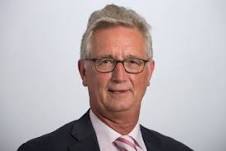IANPHI's Next Steps in 2019

IANPHI President Andre van der Zande
Dear IANPHI colleagues:
After a very promising and successful IANPHI annual meeting in London, I am looking forward to an exciting year for IANPHI. I hope 2019 will mark a next phase in the development of our International Association of National Public Health Institutes. We have reached an impressive level of NPHI participation across the globe, with more than 109 institutes in 95 countries.
Going forward, I believe it is necessary to do four things for IANPHI’s continued success in the areas of organizational improvements, formalizing systems and processes, fostering regional meetings and regional collaborations, and increasing IANPHI’s capacity for supporting NPHI growth and development.
First, because of the growth in the number of IANPHI initiatives and the complexity of NPHI’s work, we need improvements in how our organization works, including with our members and partners. This includes establishing a new legal structure for IANPHI that enables transparent and responsive management of the organization. The establishment of a new legal structure is taking place and is something we expect to finalize in the months ahead.
Second, we need to continue efforts to have formal systems and processes to support our growing number of services to one another. One of our key strengths is our peer-to-peer advice and services, which ranges from one-to-one technical assistance to larger joint programs. It will be important for us to implement effective ways to exchange information and ideas. We are off to a good start with the redesign of the IANPHI newsletter. The IANPHI Insider will replace the IANPHI World Newsletter and will be shared with our network on a bi-monthly basis. This year, the U.S. Office will be strengthening the IANPHI website, which will include more news about what IANPHI and NPHIs are working on and doing, especially to improve public health activities and outcomes. Also, the Secretariat in Paris is working on strengthening the systems for connecting NPHIs with each other. This is important because we want to help connect institutes with questions and requests with institutes who can provide experiences, insights, guidance, and solutions (e.g., best practices).
Third, IANPHI needs to continue to foster and encourage regional meetings and regional cooperation among NPHIs. The developments in Africa provide good examples. In Africa, a fast growing NPHI membership is having country-wide meetings and undertaking collaborative projects. I hope Asia and the Americas will follow this model. I also hope we can continue to foster more NPHI participation in IANPHI activities, including at the regional level.
Fourth, we need to find and have efforts and processes to organize and manage IANPHI’s ability and capacity to assist and support NPHIs as well as the funds for doing this work. While it is often possible to fulfill small requests on a pro-bono basis, larger projects or requests, and an increased number of requests, bring the need for sponsors, donors, and global partner engagement. To date, we have seen that some NPHI’s have possibilities to assist other NPHI’s. Norway, for instance, has been able to do so using Twinning Agreements. Others are very good at organizing sponsor budgets, such as how our U.S. colleagues at CHAMPS have been able to do.
Another potential mechanism is closer cooperation with global partners such as the World Health Organization (WHO), Africa Centres for Disease Control and Prevention, Association of Schools of Public Health in the European Region (ASPHER) and Association of Schools and Programs of Public Health (ASPPH). These organizations, for example, could be partners with NPHIs and for public health training and capacity building projects. However, for such things to happen we need greater awareness of IANPHI and NPHIs among these and other public health organizations and associations. Internationally, regionally, and in countries, we need people to know that IANPHI and NPHIs are valuable resources and partners when it comes to dealing with large, and often complicated, public health needs and challenges. We appreciate and hope you will continue and increase advocacy of our mission in your daily work, via social media, and at every appropriate opportunity you have during interactions with potential global partners.
In 2019, I look forward to working with IANPHI members on growing awareness of the organization its members, and expanding NPHIs’ involvement in public health efforts locally, regionally, and globally.
Sincerely,

André van der Zande, President of IANPHI